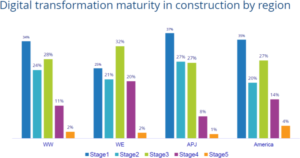IDC Survey Reveals: More Than Two in Three Construction Firms in Asia Pacific & Japan Are Prioritizing Digital Transformation
Autodesk announced the publication of an International Data Corporation (IDC) InfoBrief, “Digital Transformation: The Future of Connected Construction.”
Sponsored by Autodesk, the IDC InfoBrief – a survey of 835 construction professionals from large construction companies in countries across Europe, the Americas and Asia Pacific – assesses the construction industry’s digital transformation (DX) maturity and challenges.
According to the findings, most respondents worldwide (58 percent) are in the earliest stages of their DX journey, while 28 percent are in the middle and 13 percent are in the most mature stages.
APJ construction industry must unlock full potential of digitalisation
According to the survey, Japan leads as one of the top three most digitally mature countries globally, alongside Germany and the United States.While 69 percent of construction companies in APJ are prioritizing DX to drive changes to their processes, business models and/or ecosystems, many are struggling to unlock its full potential. 64 percent of the firms in APJ are still in stages 1 or 2 of their DX journeys, and a mere 1 percent in stage 5 (most mature). Within the region, Singapore has been identified as digitally mature having reached stages 1 and 2, but there is still opportunity to improve in order to reach stages 3, 4, and 5. Almost half of organisations in APJ spend just 3 percent or less of their annual turnover on technology, although there are some notable exceptions, such as Singapore, where 45 percent of organisations spend up to 10 percent of their annual turnover on technologies, and 22.4 percent spend up to 15 percent.

Source: IDC InfoBrief, Sponsored by Autodesk, Digital Transformation: The Future of Connected Construction, March 2020
Singapore’s top 3 challenges: Data Security, Lack of Effective Risk Management, and Outdated Technologies
The IDC survey found that a key indicator of DX maturity is the adoption of Building Information Modelling (BIM), an advanced digital modelling tool for architecture, engineering and construction – the higher the maturity, the higher the proportion of BIM-based workflows in daily operations, but only 43 percent of Singapore companies are currently investing in the technology. Respondents cite data security, lack of effective risk management and outdated technologies as top organisational barriers against implementing BIM.
Total construction demand in Singapore is expected to remain strong through 2024, reaching between S$27 billion and S$35 billion per year. To support this growth, the Building and Construction Authority (BCA) has committed to digitisation in construction, setting up the Building Innovation Panel to assess innovations to improve the industry. Its Integrated Digital Delivery (IDD) efforts, which includes BIM technology, are also crucial in enabling project stakeholders to collaborate better through the use of shared data and information platforms for greater productivity and better project management.
The Path Forward
“While many organisations worldwide have embraced digital transformation and are bringing new innovations into their businesses, the construction industry has yet to fully reap the benefits of digitalisation due to the unique challenges it faces,” said Daniel-Zoe Jimenez, AVP and APAC Head of Digital Transformation at IDC. “However, our research indicates that digital construction solutions (such as BIM workflows, bid management, project management and insights) can help improve construction projects, and construction companies are looking into new, innovative technologies to accelerate their digital transformation.”
“The APAC construction sector is at a crucial stage in its digital evolution; it is poised for growth, but companies must first take full advantage of the technologies available in order to transform. In Singapore, for instance, only two percent of organisations have automated most of their manual processes despite strong governmental and industry push for digitalisation,” said Matthew Dewees, ASEAN Head of Architecture, Engineering, Construction, and Media & Entertainment at Autodesk. “Autodesk is committed to helping organisations discern where the changes need to be made, and how to go about doing it. This is especially pertinent in times of change, where companies need to rapidly transform and adapt to new technologies in order to survive.”
Learn more and read the white paper here.




